Filter by
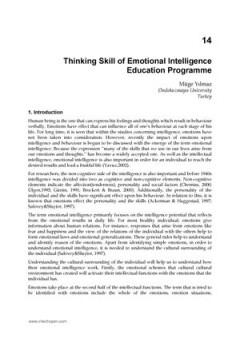
Thinking Skill of Emotional Intelligence Education Programme
Thinking Skill of Emotional Intelligence Education Programme
- Edition
- -
- ISBN/ISSN
- 9789533078380
- Collation
- -
- Series Title
- -
- Call Number
- -
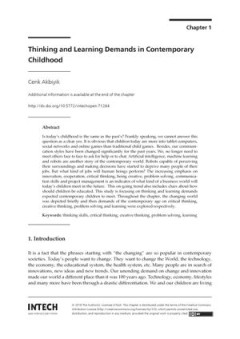
Thinking and Learning Demands in Contemporary Childhood
Is today’s childhood is the same as the past’s? Frankly speaking, we cannot answer this question as a clear yes. It is obvious that children today are more into tablet computers, social networks and online games than traditional child games. Besides, our communication styles have been changed significantly for the past years. We, no longer need to meet others face to face to ask for help or…
- Edition
- -
- ISBN/ISSN
- 9789535137382
- Collation
- -
- Series Title
- -
- Call Number
- -
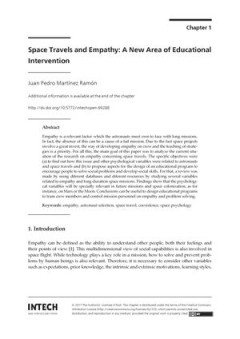
Space Travels and Empathy a New Area of Educational intervention
Empathy is a relevant factor which the astronauts must own to face with long missions. In fact, the absence of this can be a cause of a fail mission. Due to the fact space projects involve a great invest, the way of developing empathy on crew and the teaching of strategies is a priority. For all this, the main goal of this paper was to analyze the current situation of the research on empathy co…
- Edition
- -
- ISBN/ISSN
- 9789535134534
- Collation
- -
- Series Title
- -
- Call Number
- -
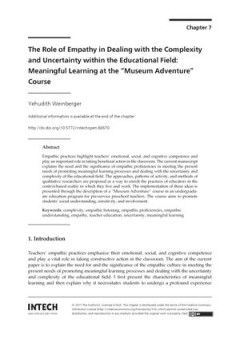
The Role of Empathy in Dealing With The Complexity and Uncertainty Within The…
Empathic practices highlight teachers’ emotional, social, and cognitive competence and play an important role in taking beneficial action in the classroom. The current manuscript explains the need and the significance of empathic proficiencies in meeting the present needs of promoting meaningful learning processes and dealing with the uncertainty and complexity of the educational field. The a…
- Edition
- -
- ISBN/ISSN
- 9789535134534
- Collation
- -
- Series Title
- -
- Call Number
- -
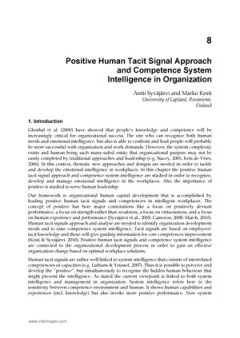
Positive Human Tacit Signal Approach and Competence System Intelligence in Or…
Positive Human Tacit Signal Approach and Competence System Intelligence in Organization
- Edition
- -
- ISBN/ISSN
- 9789533078380
- Collation
- -
- Series Title
- -
- Call Number
- -
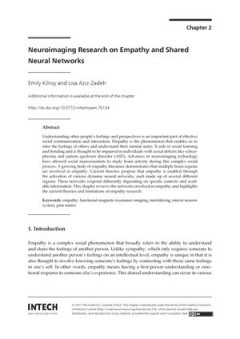
Neuroimaging Research on Empathy and Shared Neural Networks
Understanding other people’s feelings and perspectives is an important part of effective social communication and interaction. Empathy is the phenomenon that enables us to infer the feelings of others and understand their mental states. It aids in social learning and bonding and is thought to be impaired in individuals with social deficits like schizophrenia and autism spectrum disorder (ASD)…
- Edition
- -
- ISBN/ISSN
- 9789535134534
- Collation
- -
- Series Title
- -
- Call Number
- -
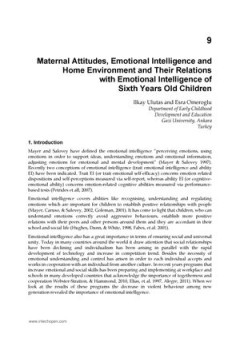
Maternal Attitudes, Emotional Intelligence and Home Environment and Their Rel…
Maternal Attitudes, Emotional Intelligence and Home Environment and Their Relations with Emotional Intelligence of Sixth Years Old Children
- Edition
- -
- ISBN/ISSN
- 9789533078380
- Collation
- -
- Series Title
- -
- Call Number
- -

Lives Blighted by Trauma - Reflections on Working with Young Refugee Children
Every child has a basic fundamental right to survival, protection and education. These and many other rights are outlined in the UNCRC (1989), a legally binding international agreement. Yet the rights of children all over the world are violated on a daily basis, as they flee armed conflict and inconceivable atrocities in countries such as Syria, Afghanistan, Iraq and Eritrea. This chapter which…
- Edition
- -
- ISBN/ISSN
- 9789535137382
- Collation
- -
- Series Title
- -
- Call Number
- -
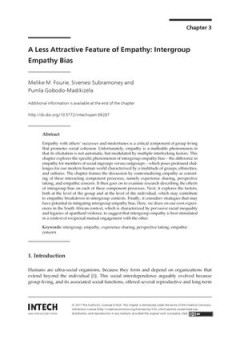
a Less Attractive Feature of Empathy intergroup Empathy Bias
Empathy with others’ successes and misfortunes is a critical component of group living that promotes social cohesion. Unfortunately, empathy is a malleable phenomenon in that its elicitation is not automatic, but modulated by multiple interlocking factors. This chapter explores the specific phenomenon of intergroup empathy bias—the difference in empathy for members of social ingroups versus…
- Edition
- -
- ISBN/ISSN
- 9789535134534
- Collation
- -
- Series Title
- -
- Call Number
- -
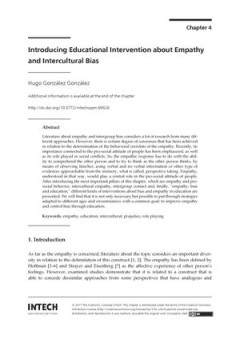
Introducing Educational Intervention about Empathy and Intercultural Bias
Literature about empathy and intergroup bias considers a lot of research from many different approaches. However, there is certain degree of consensus that has been achieved in relation to the determination of the behavioral correlate of the empathy. Recently, its importance connected to the pro-social attitude of people has been emphasized, as well as its role played in social conflicts. So, t…
- Edition
- -
- ISBN/ISSN
- 9789535134534
- Collation
- -
- Series Title
- -
- Call Number
- -
 Computer Science, Information & General Works
Computer Science, Information & General Works  Philosophy & Psychology
Philosophy & Psychology  Religion
Religion  Social Sciences
Social Sciences  Language
Language  Pure Science
Pure Science  Applied Sciences
Applied Sciences  Art & Recreation
Art & Recreation  Literature
Literature  History & Geography
History & Geography